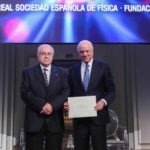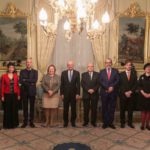The Spanish Royal Society of Physics names Francisco González a distinguished member at the annual awards ceremony
The BBVA Foundation and the Spanish Royal Society of Physics presented their annual awards to promote scientific culture and recognize high quality research, innovation and the work of young physicists. During the ceremony, BBVA Foundation President Francisco González indicated that: “Physics is a science with an ability like none other to shape our vision of the world while transforming our environment through radical technological innovation.” Furthermore, the President of the BBVA Foundation was named a distinguished member of the scientific organization for “his genuine interest in fomenting science in general and physics in particular.”

“Physics is the paradigm that thoroughly synthesizes the properties of the best knowledge: the audacity of the theoretical imagination, with precise control and experimental scrutiny,” emphasized Francisco González at the awards ceremony. For the BBVA Foundation President, “That culture associated with physics and other scientific areas can be a powerful antidote to the rampant attitude among some influential leaders of denying evidence we observe today, and the laziness of others, who do not dare to come up with solutions and innovative alternatives to some of our greatest challenges.”
González once again expressed his support for research and “the endless pursuit of knowledge, which initiated without a specific purpose in mind, ends up leading to knowledge of unimaginable facets of reality, paving the way for new technologies and technological solutions to our challenges.”
The BBVA Foundation President congratulated the award recipients, recalling “how extensive this area of science” is, born “out of human beings’ purest curiosity” and with an ability “like none other to shape our vision of the world, our cognitive frameworks, while transforming our environment through radical technological innovation.”
During the ceremony, the president of this scientific organization, José Adolfo de Azcárraga, named Francisco González a distinguished member of the Spanish Royal Society of Physics. A recognition of “his genuine interest in fomenting science in general and physics in particular”, noted Azcárraga.

Francisco González (BBVA Foundation), Rosa Menéndez (CSIC) and José Adolfo de Azcárraga (RSEF) with Physics Awards 2018 winners. - BBVA Foundation
From the chemistry of stars to nanosensors to detect cancer
The Spanish Royal Society of Physics and BBVA Foundation have presented these awards every year since 2007 to recognize the creativity, hard work and accomplishments in the field of physics - both in research and in teaching at secondary and university levels , innovation, technology and outreach.
At this year’s awards ceremony, José Cernicharo Quintanilla, Research Professor at the Institute for Fundamental Physics - Molecular Astrophysics Group at the CSIC, received the Spanish Royal Society of Physics’ Medal for being the global pioneer in molecular astrophysics and discovering 30% of the molecules known to exist in space. The Award for Physics, Innovation and Technology was presented to Francisco Javier Tamayo for discovering nanosensors that can help with early detection of cancer. And Alejandro González, expert in nanophotonics, and María Moreno, CERN researcher, were the young scientists recognized at the ceremony.
In the Teaching and Outreach of Physics categories, Chantal Ferrer Roca, of the University of Valencia - Estudi General (UVEG) received the award for teaching physics at the university level; Luis Ignacio García González of La Magdalena secondary school in Avilés received the award for teaching physics at the secondary level; Carlos Tapia and Juan Pedro García Villaluenga of the Complutense University of Madrid won the award for the Best Article on Teaching in the Spanish Royal Society of Physics’ publications; and finally, Alberto Cortijo of the Madrid Institute for Material Sciences won the award for the Best Outreach Article in the Spanish Royal Society of Physics’ publications.